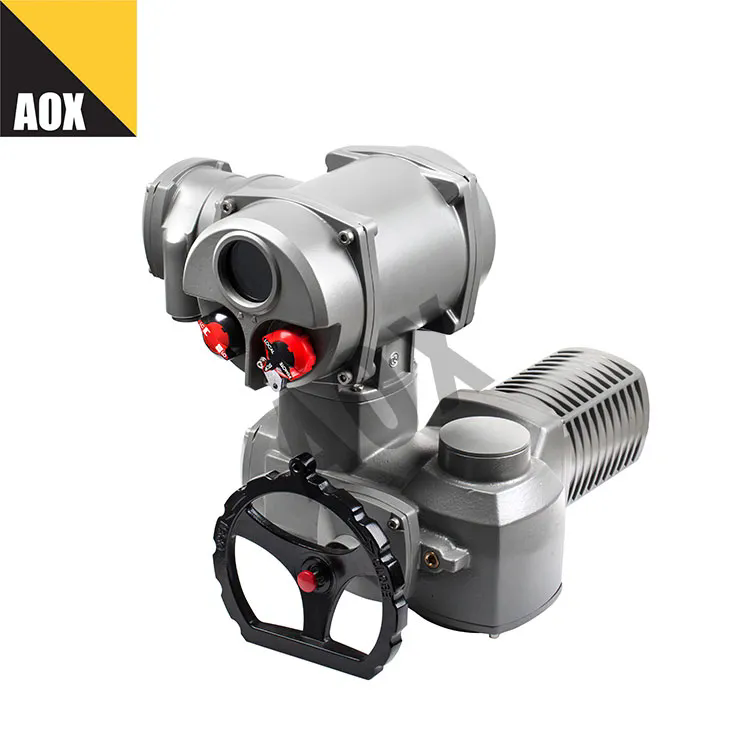How Do Electric Actuators Improve Automation Systems?
2024-12-11
In the world of industrial automation, precision, efficiency, and reliability are essential. One device that plays a pivotal role in achieving these goals is the electric actuator. But how exactly do electric actuators contribute to improving automation systems, and why are they becoming so widely adopted across various industries?
1. What Is an Electric Actuator?
An electric actuator is a device that converts electrical energy into mechanical motion. It is commonly used in automation systems to control the movement of components such as valves, dampers, doors, and various other machinery. Unlike pneumatic or hydraulic actuators, electric actuators use motors to generate motion, offering a more precise and energy-efficient alternative.
2. How Do Electric Actuators Work?
Electric actuators operate through electric motors, which drive mechanical elements like gears or lead screws to create linear or rotary motion. The motor receives electrical signals from a control system, which determines the actuator's movement. In many cases, the actuator’s movement can be fine-tuned for precise positioning, making it ideal for applications where accuracy is crucial.
3. Where Are Electric Actuators Used?
Electric actuators are used in a wide variety of applications across different industries, such as:
- Manufacturing: To automate processes like material handling, robotic arms, and conveyor systems.
- Automotive: For adjusting parts in vehicles, such as seats, mirrors, and windows.
- HVAC: To control valves, dampers, and air handling units, ensuring optimal climate control in buildings.
- Oil and Gas: For controlling valves and equipment in pipeline systems.
- Food and Beverage: To automate packaging lines and machinery, ensuring efficiency and hygiene.
4. Why Are Electric Actuators Important for Automation?
Electric actuators offer several advantages that make them ideal for modern automation systems:
- Precision: They provide highly accurate control over movement, making them suitable for applications that require fine-tuned adjustments.
- Energy Efficiency: Electric actuators tend to be more energy-efficient compared to pneumatic and hydraulic actuators, as they don’t require additional resources like air or hydraulic fluid.
- Low Maintenance: Unlike pneumatic or hydraulic systems, electric actuators have fewer components that wear out over time, reducing maintenance costs and downtime.
- Simplicity: They are easy to integrate into existing control systems and can be operated via simple electrical signals.
5. How Do Electric Actuators Benefit Industrial Processes?
In industrial settings, electric actuators contribute to smoother operations in several ways:
- Automation: They enable the automation of complex processes, improving both efficiency and safety.
- Reduced Downtime: Their reliability and ease of integration mean that there is less need for maintenance, resulting in fewer system disruptions.
- Consistency: Electric actuators help maintain consistent performance, especially in repetitive tasks, leading to higher-quality products and processes.
- Cost Savings: Due to their efficiency and low-maintenance nature, electric actuators can help businesses save money in the long term.
6. What Types of Electric Actuators Are Available?
Electric actuators come in different types to suit various needs:
- Linear Electric Actuators: These provide straight-line motion and are commonly used in applications where a push or pull movement is required.
- Rotary Electric Actuators: These provide rotational motion, commonly used in valves or equipment that require angular adjustments.
- Miniature Electric Actuators: These are compact versions ideal for applications with limited space but still requiring precise control.
- Multi-turn Electric Actuators: Used for controlling heavy-duty valves or devices that require multiple rotations to fully open or close.
7. What Are the Advantages of Electric Actuators Over Other Types?
Compared to pneumatic and hydraulic actuators, electric actuators have several benefits:
- Precise Control: Electric actuators offer smoother, more precise control over movements, allowing for highly accurate positioning.
- Environmentally Friendly: Electric actuators don’t rely on air or hydraulic fluid, making them a more eco-friendly option, as there are fewer emissions and waste products involved.
- Less Complexity: Pneumatic and hydraulic systems require pumps, compressors, and other complex components, whereas electric actuators are simpler to operate and maintain.
8. How Are Electric Actuators Evolving?
As technology continues to advance, so do electric actuators. The latest innovations include:
- Smart Actuators: With built-in sensors and communication systems, smart actuators can provide real-time feedback to control systems for more sophisticated automation.
- IoT Integration: Electric actuators are increasingly integrated with Internet of Things (IoT) systems, allowing for remote monitoring and control via smartphones or computers.
- Higher Torque and Speed: Manufacturers are developing electric actuators with higher torque and faster response times to handle more demanding applications.
Electric actuators are a cornerstone of modern automation, providing precise, efficient, and reliable motion control across industries. As industries continue to evolve and demand higher levels of automation, these devices will undoubtedly play an increasingly important role in streamlining operations and improving performance.



